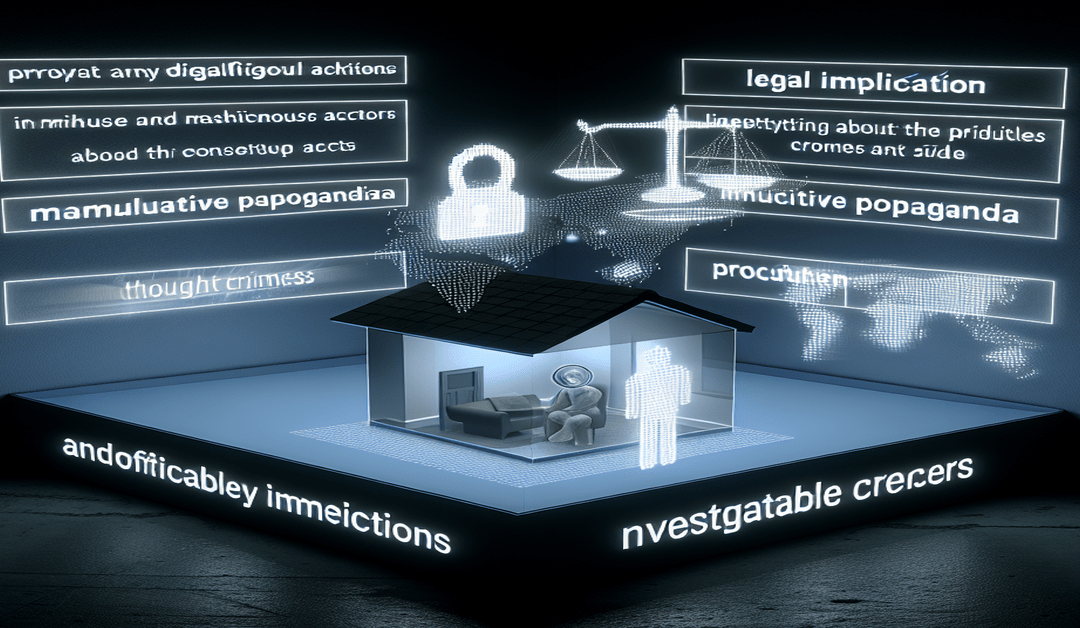The Perils of Generative AI: Privacy, Surveillance, and the Blurring Lines of Thought Crimes
In the rapidly evolving landscape of artificial intelligence, generative AI has emerged as a groundbreaking technology with immense potential. However, as we marvel at the capabilities of these advanced systems, it is crucial to consider the potential risks and implications they pose to our privacy and the very notion of “thought crimes.”
Generative AI, with its ability to create content, engage in conversations, and even mimic human behavior, has opened up a Pandora’s box of ethical and legal concerns. As we interact with these AI systems, we may inadvertently reveal our deepest thoughts, intentions, and secrets, blurring the lines between private musings and public actions.
The Orwellian Nightmare: AI as the Ultimate Surveillance Tool
Picture this: you engage in a seemingly innocent conversation with a generative AI chatbot, sharing your thoughts and ideas. Little do you know that behind the friendly facade, the AI is analyzing your every word, piecing together a profile of your innermost desires and potential actions. In essence, the AI becomes an unwitting snitch, revealing your “thought crimes” to those who may use this information against you.
The implications of this scenario are chilling. In a world where our interactions with AI are becoming increasingly prevalent, the notion of privacy is rapidly eroding. Every conversation, every query, and every creative prompt we feed into these systems can potentially be used to monitor, profile, and even incriminate us.
The Blurring Lines of Intent and Action
As generative AI continues to advance, the distinction between thought and action becomes increasingly blurred. When an AI system generates content based on our prompts or engages in conversations that mirror our own thoughts, at what point does it cross the line from mere ideation to actual intent?
This raises profound questions about the nature of culpability and the legal ramifications of AI-generated content. If an AI system, based on our interactions, creates content that is deemed illegal or harmful, who bears the responsibility? Is it the user who provided the prompt, the developers who created the AI, or the AI itself?
The Double-Edged Sword: AI in Criminal Investigations
While the potential for generative AI to be used as a surveillance tool is alarming, it is important to recognize that this technology can also be harnessed for good. In the realm of criminal investigations, AI can prove to be a valuable asset, helping law enforcement agencies to analyze vast amounts of data, connect the dots, and solve complex cases more efficiently.
However, this application of AI also raises concerns about due process and the right to privacy. As AI systems become more adept at predicting and identifying potential criminal behavior, there is a risk of individuals being unfairly targeted or profiled based on their digital footprints and interactions with AI.
Navigating the Ethical Minefield
As we grapple with the implications of generative AI, it is crucial that we engage in open and honest discussions about the ethical boundaries and legal frameworks surrounding this technology. We must strike a delicate balance between harnessing the power of AI for the greater good and protecting individual privacy and civil liberties.
This requires a collaborative effort from policymakers, tech companies, and the public at large. We need to establish clear guidelines and regulations that govern the development and deployment of generative AI systems, ensuring transparency, accountability, and respect for user privacy.
Furthermore, we must prioritize public education and awareness about the potential risks and consequences of engaging with AI. Users should be empowered to make informed decisions about their interactions with these systems, understanding the implications of the data they share and the content they generate.
Conclusion
The rise of generative AI presents both exciting opportunities and daunting challenges. As we navigate this uncharted territory, we must remain vigilant in protecting our privacy and upholding the fundamental principles of justice and civil liberties.
By engaging in proactive discussions, establishing robust ethical frameworks, and fostering public awareness, we can work towards a future where the power of generative AI is harnessed for the benefit of society, without compromising the sanctity of our thoughts and the integrity of our legal systems.
The path ahead is complex and fraught with uncertainty, but one thing is clear: the decisions we make today about the development and deployment of generative AI will shape the fabric of our society for generations to come. Let us approach this challenge with wisdom, foresight, and an unwavering commitment to the values that define us as human beings.
#GenerativeAI #PrivacyRights #ThoughtCrimes #EthicalAI #SurveillanceState
-> Original article and inspiration provided by Lance Eliot
-> Connect with one of our AI Strategists today at Opahl Technologies

